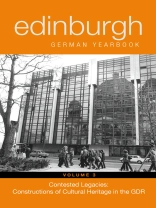Fresh perspectives on the cultural history of the German Democratic Republic, exploring the nation’s dialogue with the German past.
Established, commissioned, and edited by the Department of German at the University of Edinburgh,
Edinburgh German Yearbook encourages and disseminates lively and open discussion of themes pertinent to German Studies, viewed from all angles but with particular interest in problems arising out of politics and history. No other yearbook covers the entire field while addressing a focused theme in each issue.
Coinciding with the twentieth anniversary of the fall of the Berlin Wall, volume 3 re-directs current debates on memory and tradition, opening up fresh perspectives on the cultural history of the GDR and exploring how the nation’s cultural discourses entered into a productive but often problematic dialogue with the values of the past and with the German cultural inheritance. Topics include the compositional engagement with musical heritage; industrial design and cultural politics; the establishment of antifascist monuments and their use as sites of resistance; constructions of a cultural heritage in architecture; the influence of cultural politics on literary scholarship; continuities and breaks with tradition in visualand literary culture; and engagement with the past in the works of Konrad Wolf, Irmtraud Morgner, and Anna Seghers.
Contributors: Leonie Beiersdorf, Julian Blunk, Dara Bryant, Helen Finch, Carola Hähnel-Mesnard, Stacy Hartman, Elaine Kelly, Heather Mathews, Katharina Pfützner, Matthew Philpotts, Larson Powell, Tim Reiß, Marianne Schwarz-Scherer, Laura Silverberg.
Matthew Philpotts is Lecturer in German at the University of Manchester, and Sabine Rolle is Lecturer in German at the University of Edinburgh.
สารบัญ
Introduction – Matthew Philpotts and Sabine Rolle
‘It is not the same Bach, Beethoven, and Brahms’: East German New Music and the ‘Divided’ German Heritage – Laura Silverberg
The Individual and the Romantic Aesthetic: Compositionl Engagement with Romanticism in the GDR – Elaine Kelly
‘Auferstanden aus Ruinen’: Die Konstruktion kultureller Traditionen einer traditionslosen Gesellschaft im Wiederaufbaufilm der SBZ – Julian Blunk
Representations of a Modern Dictatorship? Max Lingner and the Reichsluftfahrtministerium – Matthew Philpotts
Industrial Design and Cultural Politics in the GDR 1950-1965 – Katharina Pfützner
From Narrative to Symbol: The Development of the Anti-Fascist Monument in the Early GDR – Leonie Beiersdorf
Queering the Antifascist State: Ravensbruck as a Site of Resistance – Dara Bryant
Mediations of Memory: Konrad Wolf’s
Mama, ich lebe – Larson Powell
Das ‘Allgemein-Menschliche’ und die ‘deutsche Kulturnation’: Zum Zusammenhang von Kulturpolitik und Literaturwissenschaft in der DDR-Germanistik der siebziger und achtziger Jahre – Tim Reiß
Recalling the Goddess Pandora: Irmtraud Morgner’s Utopian Appropriation of Goethean Poetics in
Amanda – Helen Finch
‘A Romance with One’s Own Fantasy’: The Nostalgia of Exile in Anna segher’s Mexico – Stacy Hartman
Zur Relation von Gattung, Erbe und asthetischem Diskurs in der DDR – Marianne Schwarz-Scherer
Socialist Realism and the Third German Art Exhibition 1953 – Heather E. Mathews
Continuities in Visual Culture in the GDR and the Break with Tradtions in the Late 1980s: Examples from the Leipziger Hochschule fur Grafik und Buchkunst – Sophie A. Gerlach
Distinktionsstrategien im literarischen Feld und die Aktualisierung tabuisierter Traditionen in der selbst verlegten Literatur der 1980er Jahre – Carola Hähnel-Mesnard
เกี่ยวกับผู้แต่ง
Larson Powell is Curator’s Professor of Film Studies at University of Missouri, Kansas City.












